

Self-Improving Artificial Intelligence. 2 Billion Jobs to Disappear by 2030. How Technology Is Destroying Jobs. Given his calm and reasoned academic demeanor, it is easy to miss just how provocative Erik Brynjolfsson’s contention really is.

Brynjolfsson, a professor at the MIT Sloan School of Management, and his collaborator and coauthor Andrew McAfee have been arguing for the last year and a half that impressive advances in computer technology—from improved industrial robotics to automated translation services—are largely behind the sluggish employment growth of the last 10 to 15 years. Even more ominous for workers, the MIT academics foresee dismal prospects for many types of jobs as these powerful new technologies are increasingly adopted not only in manufacturing, clerical, and retail work but in professions such as law, financial services, education, and medicine. That robots, automation, and software can replace people might seem obvious to anyone who’s worked in automotive manufacturing or as a travel agent.
Technological Unemployment. 45 percent of American jobs will be done by computers in 20 years. Hi, I’m a Robot and I’m Here To Take Your Job. In September 1989, GE Chairman Jack Welch flew to Bangalore, India for a breakfast meeting with an Indian delegation that included Prime Minister, Rajiv Gandhi.
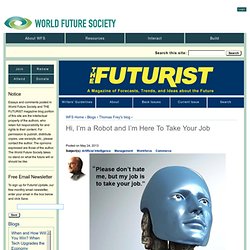
The purpose of his trip was to sell airplane engines and medical equipment to India, but the meeting took an interesting twist along the way. Rather than buying what GE has to sell, the Prime Minister Gandhi proposed that GE buy software from India. After looking at the amazingly low labor costs, Welch decided instead to outsource portions of its business starting with Bangalore’s first call center. This short meeting led to an outsourcing revolution that would dramatically transform both the Indian and U.S. economies.
We are now on the verge of another business transformation, but this time workers are not being replaced by low cost labor in other countries. Science fiction writers have led us to believe that humanoid robots, with all the nuanced skills and talents of humans would be walking among us today. Telemarketer Robot Swears She's Not a Robot. The phone call came from a charming woman with a bright, engaging voice to the cell phone of a TIME Washington Bureau Chief Michael Scherer.
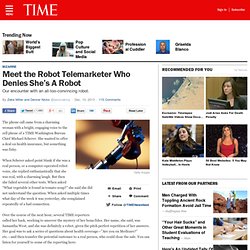
She wanted to offer a deal on health insurance, but something was fishy. When Scherer asked point blank if she was a real person, or a computer-operated robot voice, she replied enthusiastically that she was real, with a charming laugh. But then she failed several other tests. When asked “What vegetable is found in tomato soup?” Robots as care givers. Metal Theft on the Rise?

As the value of metals increases, so does the likelihood of theft. But it isn’t just the local thugs ripping gold chains off our necks that we’ll have to worry about. Metal theft may become one of the biggest criminal activities of the twenty-first century, warns University of Indianapolis criminologist Kevin Whiteacre. Targets may include construction sites, vehicle parts, plumbing and electrical equipment, and public infrastructure, where thieves see value not just in the manufactured goods themselves but also in their component metals. Most Americans not Fit to Join. Most Americans not Fit to Join Associated Press | March 13, 2006 WASHINGTON - Uncle Sam wants YOU, that famous Army recruiting poster says.

Welcome, Robot Overlords. Please Don't Fire Us? Illustrations by Roberto Parada This is a story about the future.
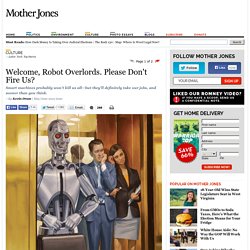
Not the unhappy future, the one where climate change turns the planet into a cinder or we all die in a global nuclear war. Over 12 million robots will do everything. Global Challenges excerpt from the 2010 State of the Future report Information Technology How can the global convergence of information and communications technologies work for everyone?
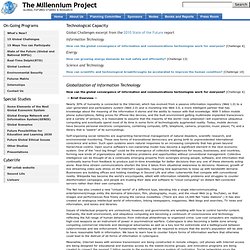
[Challenge 6] Energy How can growing energy demands be met safely and efficiently? Science and Technology How can scientific and technological breakthroughs be accelarated to improve the human condition? How can the global convergence of information and communications technologies work for everyone? From Drones to Killer Robots - Are We Crossing a Line? December 28, 2013 - I've been reluctant to write about technology and war on this blog site with 16 out of over 700 looking at the subject.
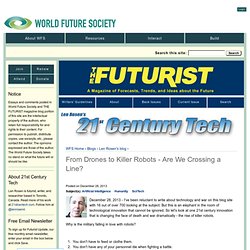
But this is an elephant in the room of technological innovation that cannot be ignored. So let's look at one 21st century innovation that is changing the face of death and war dramatically - the rise of killer robots. Why is the military falling in love with robots? You don't have to feed or clothe them.You don't have any of your personnel die when fighting a battle.Robots work 24 x 7 - no sleeping on the job.Robots don't question orders.Robots when they die don't feel the pain. Drone ships in Rolls-Royce's future? The next revolution in cargo will be the container ship drone.
Why tech no longer creates jobs. Can technology set off a new boom in job creation?
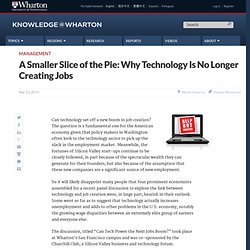
The question is a fundamental one for the American economy given that policy makers in Washington often look to the technology sector to pick up the slack in the employment market. Meanwhile, the fortunes of Silicon Valley start-ups continue to be closely followed, in part because of the spectacular wealth they can generate for their founders, but also because of the assumption that these new companies are a significant source of new employment. So it will likely disappoint many people that four prominent economists assembled for a recent panel discussion to explore the link between technology and job creation were, in large part, bearish in their outlook. Some went so far as to suggest that technology actually increases unemployment and adds to other problems in the U.S. economy, notably the growing wage disparities between an extremely elite group of earners and everyone else.
It’s a double-barreled effect, Brynjolfsson added. Fastest Way to Create New Jobs? Automate Them Out of Existence! Is Japan heading for a Zombie future? Demographic Sunset in the Land of the Rising Sun: Japan in the 21st Century By Michael Lee, Founder of the Southern African Chapter of the World Future Society.

Japan robot chats with astronaut on space station. The first humanoid robot in space with speech capability made small talk with a Japanese astronaut and said it had no problem with zero gravity on the International Space Station. Footage released by the robot's developers on Friday showed Kirobo performing its first mission on the station, talking in Japanese with astronaut Koichi Wakata to test its autonomous conversation functions. Wakata says he's glad to meet Kirobo, and asks the robotic companion how it feels about being in a zero-gravity environment.
"I'm used to it now, no problem at all," Kirobo quips. Kirobo is programmed to process questions and select words from its vocabulary to construct an answer, instead of giving pre-programmed responses to specific questions. The creator of the robot, Tomotaka Takahashi, said the autonomous functions meant nobody knew how well Kirobo would be able to answer Wakata's questions.
Disaster Prevention and Recovery Plan. Capital Homestead Act. Q&A with James Kuffner, Google Robotics Researcher. At a racetrack in Florida this weekend, 16 robots competed to complete a series of tasks inspired by challenges faced in cleaning up the destroyed Fukushima-Daiichi nuclear power plant. Two of the companies involved in the DARPA contest—Boston Dynamics and Schaft—were recently acquired by Google, which has also bought at least six other robotics companies in recent months.
The age of the industrial internet. How the internet is making us poor. Everyone knows the story of how robots replaced humans on the factory floor. But in the broader sweep of automation versus labor, a trend with far greater significance for the middle class—in rich countries, at any rate—has been relatively overlooked: the replacement of knowledge workers with software. Robots, AI and Unemployment.
Econfuture offers random thoughts on what the economy of the future will look like. Lights in the Tunnel.